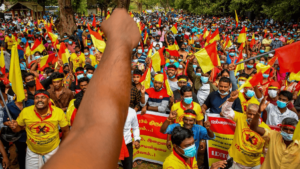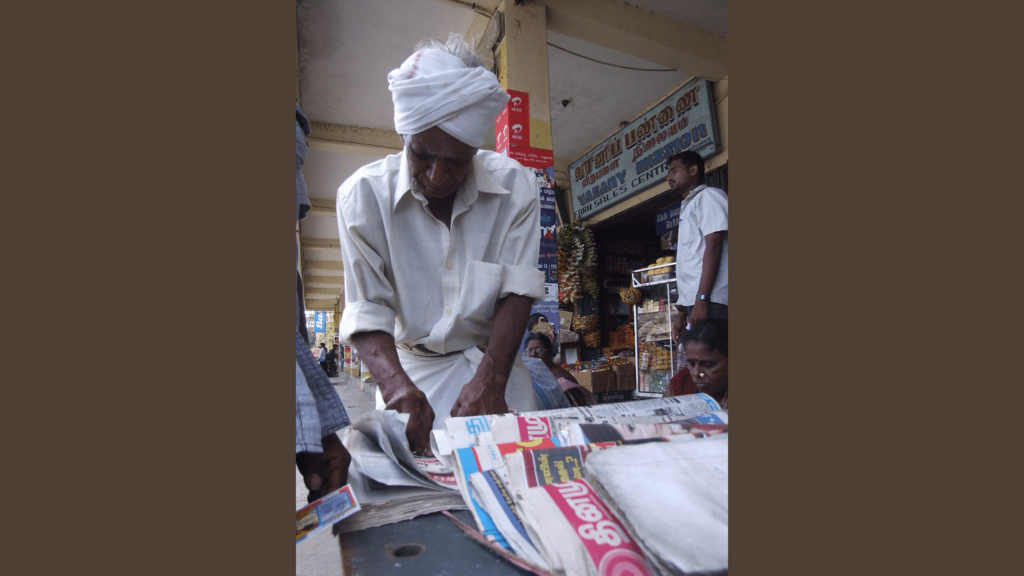Read in : தமிழ்
As the Sri Lanka crisis intensifies, the agitation against the Rajapaksas has started yielding results. The Rajapaksas are unable to digest that the people who backed them have lost faith in them.
Dictators and those who don’t go by democratic norms use violence to retain power. But this is not new for the Rajapaksas. They know that violence can be gainful. But they didn’t realize violence will not always yield results. The brutal violence unleashed and the blowback on May 9 showed broad people support for the young protesters.
Violence has often been a weapon used by Sri Lankan rulers. It was unleashed on Muslims in 1915. In 1958, race riots broke out in which Tamils were butchered and their belongings were destroyed.
On Monday, violence was let loose on protesters. Eyewitnesses talk about some people being fed with liquor and let loose by the Rajapaksas on protesters in a planned way. Supporting dictators turns people into anti-socials.
The support for protesters has only grown. Common people are giving it back to Rajapaksa’s people, setting fire to their property. But the students who started the protest have not done this.
The burnt down Gota-Go Village, the hub of the protests, has been reconstructed quickly with generous help from common people. The slogan, Gota Go Home, has only become louder.
The anger and disgust with the Rajapakasas was unimaginable until recently. What’s remarkable is this is coming from the Sinhalese, which shows that whoever acts wrong and is unjust has to pay the price. Sri Lankan and world history stand testimony to this.
When they were oppressed and harmed, the Sinhalese kept mum. So Tamils should not participate in their protests, some feel, adding Tamils will not only not benefit from the protests but their cause will be harmed.
It’s been a month since Sinhalese university students launched the Gota Go Home (GGH) protest and it has now taken wings. The agitation has spread and many other slogans and demands are being raised. Few protests have, however, happened in support in the north and the east although Tamils in Colombo, northern Tamils and plantation Tamils are participating in the Colombo protests.
Though started by university students, middle class folks working in private firms, non-government organizations and government employees are participating in the protests. Women, children, mothers, doctors and trade unions are also protesting continuously. The intensity has been increasing every day, Gota Go Home villages have sprouted elsewhere too.
Tamil opinion is divided on whether to participate in the protests. When they were oppressed and harmed, the Sinhalese kept mum. So Tamils should not participate in their protests, some feel, adding Tamils will not only not benefit from the protests but their cause will be harmed.
Some are saying they went through worse during the conflict. The oppression, economic blockade and power cuts were more intense but they bore them. They learned to bear with no food. So the economic situation now is not as bad.
The understanding of the stay-away group is that this protest is over the economic situation and food. And that’s not reason enough to support. Further, the bad experiences of the past are outweighing any sympathy they may have for the Sinhalese protesters.
Tamils who have faced 40 years of oppression and being watched upon by intelligence agencies are afraid. They feel that if they participate, the CID will come home and arrest their sons and daughters. Muslims also have this fear. This is expected. It’s a fear that has seeped into the bones because of the brutality they faced in the past.
Diaspora Tamils have however supported the protests. They are demanding the Rajapaksas should be brought down.
But Tamils have to understand the roots of the Sri Lanka crisis so they can make an intelligent decision. In 2021, the president banned the import of inorganic fertilizers on the grounds that these were harmful to crops and the soil. But people soon came to know that the real reason was that the government did not have the money to import these fertilizers.
Farmers were put to much hardship as a result. Their livelihood became uncertain. Further, organic fertilizer production was not keeping up. In this difficult situation, farmers started protesting.
Without adequate foreign reserves, import of milk powder got disrupted. Mothers came to the streets to protest.
Then there was no money to pay for the import of fuel. This brought do

Tamils in Jaffna protesting in January demanding justice. They should come out and join the protests so they can achieve Constitutional reform (Photo Credit: Twitter handle @Thusi_Kumar, Dr. Thusiyan Nandakumar)
wn power production. Extended power cuts became the order of the day. This affected industrial production. The overall economic situation worsened. The production of tea and textiles, which are big foreign exchange earners, was affected as a result of power cuts. Tea procurers moved to India and Nepal as a result. Textile production reduced and that in turn reduced foreign exchange earnings. Women working in plantations and the north-east textile units were hit. The families that depended on their income were hit, too. As the situation spiraled out of control, availability of essential items reduced and prices went up. The Sri Lanka crisis became a full blown one.
The same government machinery that oppressed Tamils all these years is now trying to suppress the Sinhalese protesters who now see how brutal it is. The mayhem unleashed on Colombo streets on May 9, 2022, will help Tamils show the world what happened in the north and the east. The average Sinhalese just doesn’t know what Tamils went through in 40 years. Race and religion were used for political gain by the Buddhist rulers in the name of opposing terrorism.
The Sinhalese were blind to the lack of democracy, lack of respect for democracy, poor law and order situation and poor governance. They didn’t question these because they were under the spell of racism and communalism.
For all of 70 years of Independent Sri Lanka, Tamils have been oppressed as a minority. Sinhalese Buddhist hegemony has ruled Sri Lankan politics. As per the Constitution, no member of the minority can become president or prime minister. Only Sinhalese Buddhists can aspire for these posts.
Though the Constitution says everyone is equal in terms of grant of fundamental rights, political power is not shared with minorities. This has been a key factor driving discrimination against Tamils. The Constitution should be amended to guarantee that everyone in Sri Lanka should be free to protect their identity and enjoy all rights and opportunities so they could live dignified lives.
Minorities should have the same status as the majority. Only then the Tamil problem will get solved in Sri Lanka. Not only that the human rights abuses in recent times should be accounted for, but the rulers should take responsibility for it.
The President should no more be the decision making executive authority. This system should be abolished. This system helped one family exploit the entire system. It also put the President beyond review and question, leading to authoritarianism and misrule. Further, the anti terrorism act brought into force in 1978 should be abolished.
People speaking all languages and following other religions should be able to live peacefully with security. The Sinhalese are realizing that now. It is now clear that the system of executive presidency was the root cause of the economic crisis. Tamils and Tamil political parties that support the Rajapaksas should understand the situation regarding the executive presidency. They should realize that what has happened to the Rajapaksas today will apply to those who supported them in future. The Constitution should uphold the right of everyone in Sri Lanka to participate in politics.
If Tamils come out in support of the protesters demanding Constitutional reform, the Sinhalese will appreciate it and support them in return. It is an opportune time for Tamils to get justice through Constitutional reform. If Tamils don’t participate in what is happening, they will miss an opportunity.
If Tamils come out in support of the protesters demanding Constitutional reform, the Sinhalese will appreciate it and support them in return.
The Sri Lanka crisis is an opportunity for Tamils to shake off the oppression and seek justice and equal opportunities in future. Protesting students and youth will become tomorrow’s political leaders and policymakers. The links that Tamils forge with them now will help tomorrow when Tamils aspire to lead a life of equal status with Sinhala Buddhists.
Tamils and Tamil speaking Muslims should join hands with protesters and those seeking change. This is not the time to seek revenge on Sinhalese and stay out. They should seek reform in the Constitution so their rights are secured.
Sri Lankans should learn to fight injustice that is meted to anyone in Lanka society. The attitude of condoning unjust acts done by those belonging to one’s community should stop. The time has come for everyone in Sri Lanka to put behind identities such as race, religion and political affiliation and come forward as humans. This is what the Sri Lanka crisis is teaching all Sri Lankans.
(The author is a human rights activist in Sri Lanka)
Read in : தமிழ்
